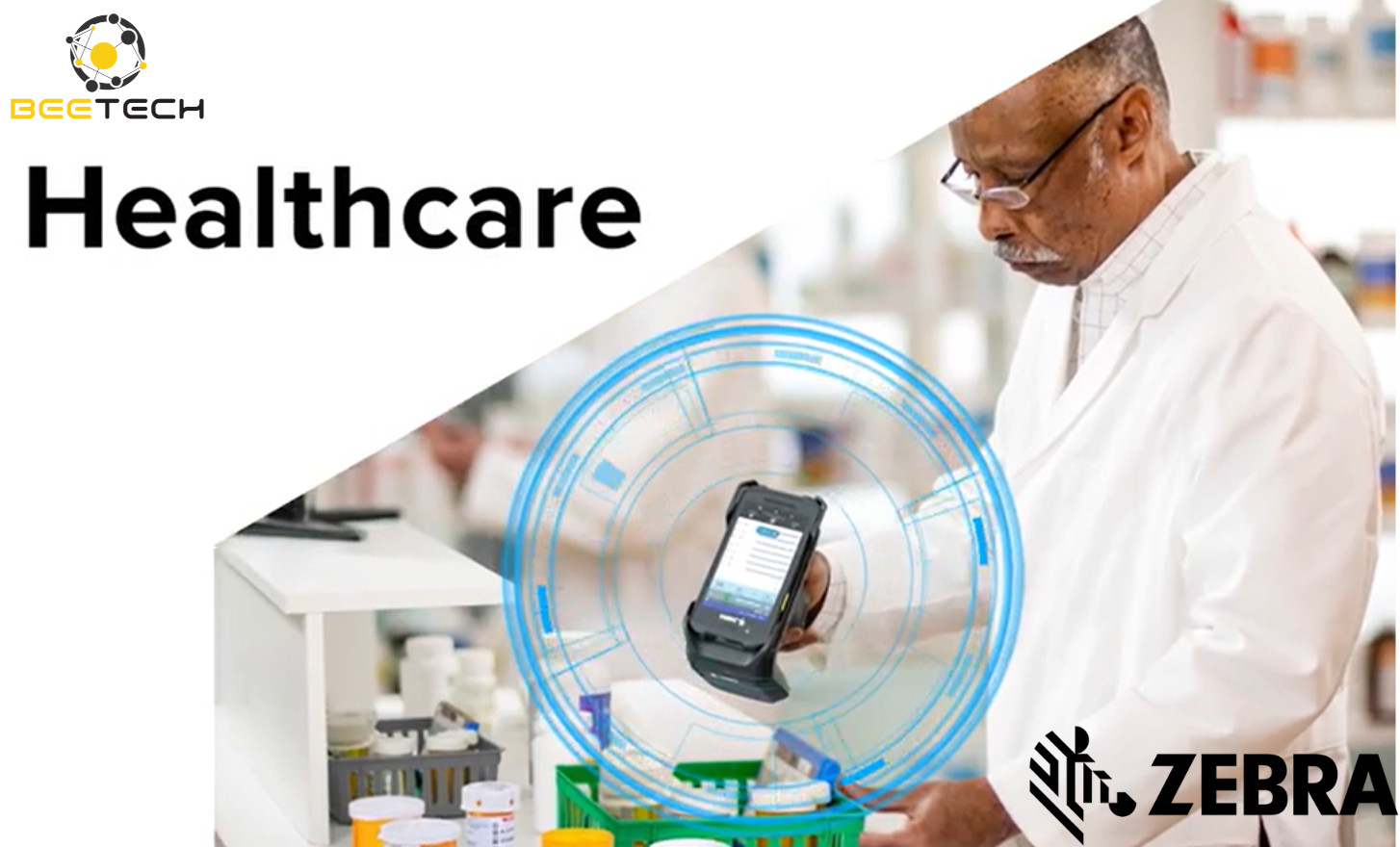80-82 Cao Duc Lan, District 2, HCMC, Vietnam
+84 76 865 6688
info@beetech.com.vn
+84 76 865 6688
About us
Contact us
80-82 Cao Duc Lan, District 2, HCMC, Vietnam
+84 76 865 6688
info@beetech.com.vn
+84 76 865 6688
About us
Contact us

RFID Solutions in Healthcare
The healthcare industry faces significant pressure to control assets, patients, and medical supplies accurately, safely, and efficiently. However, many hospitals still rely on manual methods or disconnected management systems, leading to the following issues:
30-40% of medical equipment in large hospitals is underutilized or lost (according to Frost & Sullivan).
Over 25% of healthcare staff time is spent searching for equipment or medical records (Health IT Analytics, 2023).
Patient or medication errors account for 8% of severe medical incidents (Pennsylvania Patient Safety Authority).
Inventory checks for supplies and medicines take hours, are prone to errors, and lack expiry warnings or stock shortages.
These challenges not only impact operational costs but also pose a risk to treatment quality and patient safety. This is when the healthcare industry needs an automated, accurate solution that allows real-time monitoring.
RFID (Radio Frequency Identification) is becoming one of the most advanced technological solutions helping the healthcare industry address asset, patient, and medical supplies management effectively.
Each medical device, medication, or patient record is assigned an RFID tag (in the form of a label, wristband, or card). Information is recorded and retrieved wirelessly by RFID readers, enabling real-time tracking of location, status, and usage history without physical contact.
24/7 Equipment Tracking: Reduces up to 80% of the time spent searching for medical equipment, ensuring availability when needed.
Asset Loss Prevention: Monitors the movement of assets within the hospital premises, preventing theft and misuse.
Safer Patient Management: Assigns RFID wristbands to patients for precise identification, ensuring the right patient receives the right medication and treatment.
Automated Stock Management: Reduces inventory time from hours to minutes, providing timely alerts for near-expiry medications or low stock levels.
Real-time Data: Helps hospital leadership make faster and more accurate decisions.
According to a report from Emergen Research, the global RFID market in healthcare is projected to exceed USD 12 billion by 2027, highlighting the growing trend of RFID technology adoption in the industry.
RFID is not just a management tool, but a solution to specific “pain points” in healthcare operations. Here’s how RFID is applied effectively across different areas:
Issue: Equipment such as monitors, infusion pumps, ventilators, and infusion carts are often misplaced, hard to track, and lead to wasted assets.
RFID Solution:
Attach RFID tags to each device.
The system reads and records the equipment’s real-time location.
Alerts are triggered when equipment moves outside designated areas.
Benefits:
Reduces equipment loss and theft.
Optimizes usage: Know which equipment is idle and available.
Supports rapid inventory checks without halting operations.
Issue: Patient mix-ups, incorrect treatment records, and difficulty tracking patient journeys within the hospital.
RFID Solution:
Assign RFID wristbands to patients upon admission.
The system automatically identifies the patient and retrieves their medical records when visiting clinics, operating rooms, or pharmacies.
Benefits:
Reduces errors in surgery and medication prescriptions.
Enhances patient safety and personalized care.
Automates patient data entry.
Issue: Manual inventory checks are slow, lead to losses, and fail to provide timely expiry warnings or stock shortages.
RFID Solution:
Attach RFID tags to each batch of medication/supplies.
RFID readers in the storage area track and record items entering and leaving.
Automated alerts for low stock or expiring items.
Benefits:
Reduces wastage of consumables.
Ensures that medications and supplies are always available for treatment.
Inventory checks are completed in minutes instead of hours.

National University Hospital (Singapore): Reduced equipment loss by 30% after implementing RFID across the hospital.
Seoul St. Mary’s Hospital (South Korea): Used RFID to ensure the right patient receives the right medication and dose.
Veterans Health Administration (USA): RFID system helps manage over 1 million medical devices with high efficiency.
| Area | Specific Benefits |
|---|---|
| Equipment | Reduces loss, optimizes usage |
| Patient | Safe treatment, real-time management |
| Supplies/Medications | Inventory control, expiry alerts |
| Operations | Saves time in inventory, increases efficiency |
| Cost | Cuts losses from unclear asset and supply management |
As 2025 approaches, RFID technology will undoubtedly reshape operations in the healthcare industry. This is the time for hospitals, clinics, and healthcare facilities to adopt RFID not only to cut costs but also to enhance safety, accuracy, and operational efficiency in patient care.
Automation and Process Optimization: Hospital processes from inventory management to patient tracking will be fully automated, minimizing errors and risks.
Cost Reduction: RFID helps cut costs related to asset loss, material replenishment, and maximizes equipment utilization.
Enhanced Patient Safety: RFID is not only essential for asset management but also plays a crucial role in preventing medication errors, improving overall care quality.
Telemedicine and Remote Care: RFID will support effective management of medical records remotely, allowing doctors and patients to track treatments and health data anytime, anywhere.
Smart Healthcare: Hospitals will adopt smarter systems, where all devices and supplies are automatically monitored, enhancing productivity and minimizing mistakes.
Data Security and Traceability: RFID will play a key role in securing and tracking healthcare data, especially as data security regulations become stricter.
The year 2025 is just around the corner, and hospitals that fail to update to RFID technology will face significant challenges: from increased operational costs to reduced patient care quality. Adopting RFID today will help your facility stay ahead, meet the increasing demands of patients, and comply with stringent industry regulations.

RFID technology is opening a new era in healthcare, addressing critical challenges in asset management, patient tracking, and supplies control. With its automation, precision, and error reduction capabilities, RFID not only reduces costs but also enhances patient safety and care quality.
As 2025 approaches, hospitals, clinics, and healthcare facilities must embrace RFID technology to stay competitive, improve operational efficiency, and enhance service quality for patients.
Start your digital transformation journey with RFID today to open the door to a smarter, safer, and more efficient healthcare future.
If you’re looking for a quality RFID solution tailored to your hospital or healthcare facility’s needs, Beetech is your trusted partner. With years of experience in the industry and deep knowledge of RFID technology, we’ll help you implement the optimal RFID system, tailored to your specific requirements.
Contact Beetech today for expert advice on RFID solutions and to obtain genuine, high-performance devices with long-term warranty support.
Beetech – Your trusted RFID solution provider for healthcare!
📧 Email: info@beetech.com.vn
🌐 Website: https://beetech.com.vn
